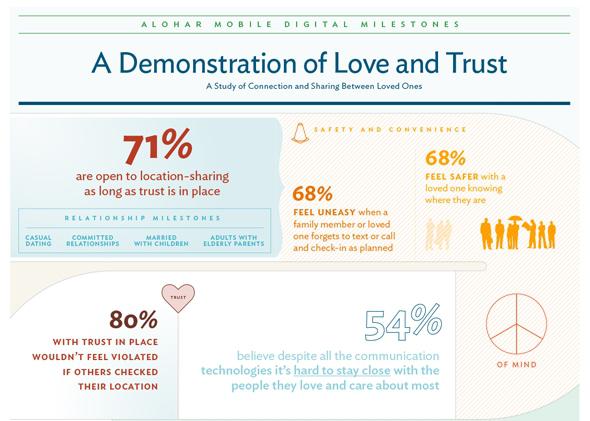Since it debuted in 2011, people have been creeped out by Apple’s Find Friends location-sharing service. Agreeing to let someone see where you are all the time is a big step. But location tracking isn’t going away. For example, Apple is integrating optional tracking into new family-sharing features and iMessage in iOS 8 this fall. But the people won’t stand for it, right?! Actually, according to a new survey, yes, yes they will.
The survey comes from Alohar, a startup that offers ambient, continuous location tracking as a means of communication. Instead of telling your mother-in-law that you’re stopping at the store before you visit her, she can just see it. Or if you don’t have time to tell your boyfriend that you’re running late, he can just check. The goal is to use location tracking to make communication easier, and Alohar’s website also says that the service can “build trust, and strengthen relationships.”
“There’s always a privacy concern in the back of people’s minds,” said Sam Liang, Alohar’s CEO and founder. “But the survey results show that it’s more about trust in relationships. If [users] have trust, most people actually have no problem sharing their location.”
Of the 522 people nationwide who were surveyed, most weren’t too concerned about sharing location data with people they are close to. Eighty percent said there is someone in their lives whom they would share their location with at any time. And 81 percent said that there is someone in their lives whom they trust 100 percent. “It’s really reassuring for humanity at large,” Dave Smiddy, Alohar’s vice president of products said, laughing.
The data contain some interesting insights into people’s attitudes toward privacy. For example, 91 percent of respondents said that “privacy is about having control over who knows certain things about me.” Less than 9 percent said that “privacy is about nobody knowing anything about me.”
The results get really interesting when you delve into the age breakdowns. One question about whether respondents would share their location with a trusted loved one, and whether they have a loved one who would share their location back, had more positive responses from people 30 and older than from 18- to 29-year-olds. Respondents who are 30 to 44 were the most enthusiastic about sharing their location with someone they trusted. And people 45 to 60 felt most sure that a loved one would share their location with them. In another question, younger people were more likely to say that it’s hard to stay close to people in spite of social networks and other digital communication tools.
Given the stereotype that young people who grew up in the digital age share information freely and are addicted to social media, it’s surprising that they are the ones who would be most reluctant to share their whereabouts, and feel the most disconnected. But they may have fewer trusted people in their lives if they haven’t entered a committed relationship yet, or they may be doing more things they want to hide from loved ones. On the other hand, tech literacy could be affecting how enthusiastic older respondents are about sharing their location or assuming that others will share it with them, and they may not rely on social media as much in the first place to help them stay in touch with people.
Or there could be other factors entirely. For example, it’s possible that people answered the survey based on what they wish were true about the trust and transparency in their relationships rather than what actually is. And it’s especially important to think about factors that could underlie the results because it’s always a little weird when a company commissions a study whose results reflect positively on its product.
Still, between smartphones and connected wearables for health tracking, it seems inevitable that location tracking is going to become standard in our lives. It hasn’t quite taken off yet, but Alohar is clearly relieved that its survey seems to say people are ready. Are you?
